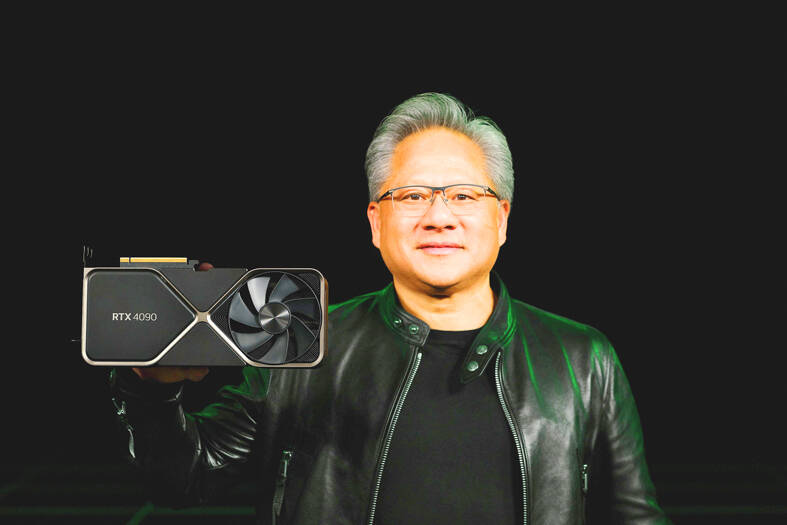Nvidia Corp on Wednesday told investors that demand remains strong for its artificial intelligence (AI) and data-center chips, even as the company continues to struggle with a slowdown in the PC market.
While revenue declined 17 percent to US$5.93 billion in the fiscal third quarter, that handily beat the US$5.79 billion average estimate.
Nvidia’s data center unit posted a 31 percent sales increase, also beating projections.

Photo: Reuters
That helped make up for a 51 percent drop in the company’s gaming business — a market tied to PC sales.
Although Nvidia’s outlook for this quarter missed some estimates, the forecast was solid enough to satisfy analysts, or at least remove concerns that its business is rapidly deteriorating.
Fundamentally strong demand for machines that run AI software would help the company weather a difficult economic environment, particularly in China, Nvidia chief executive officer Jensen Huang (黃仁勳) said in an interview.
After excessive inventory is cleared, this quarter would show sequential growth, helped by the debut of new products, the company said.
However, even while adding a dose of optimism, Huang said that the economy and COVID-19 restrictions in China would continue to take a toll.
“The macro environment is still difficult,” he said. “Inflation is real. COVID lockdowns in China still exist.”
Data center sales were helped last quarter by orders from US cloud service providers, with demand weakening in China, Nvidia said.
The division generated US$3.83 billion in revenue in the third quarter, compared with a US$3.79 billion estimate.
The firm earlier on Wednesday announced further inroads into the data-center market, when it said that Microsoft Corp would use its graphics chips, networking products and software for a new AI offering.
Santa Clara, California-based Nvidia expects fourth-quarter revenue to be about US$6 billion, plus or minus 2 percent. That compares with an estimate of US$6.09 billion.
Third-quarter profit was US$0.58 per share, excluding some items, short of the US$0.7 projection.
The company is caught up in the worsening standoff between China and the US. Washington is increasingly trying to cut China off from advanced chip technology, threatening Nvidia’s access to the market.
The company’s best AI offerings are now subject to licensing requirements for export to China, a hurdle that the company said might cost it hundred of millions of dollars in lost revenue.
Nvidia recently debuted a new offering for the China market that it says is compliant with the restrictions.
Nvidia’s outlook was more upbeat than that of Micron Technology Inc earlier on Wednesday.
Micron warned that it was cutting production because next year would be worse than previously feared.
It is reducing production of DRAM and NAND wafers by about 20 percent compared with the fiscal fourth quarter “in response to market conditions,” Micron said in a statement.
Year-on-year DRAM bit supply would need to shrink and NAND bit supply growth would need to be significantly lower than previous estimates, the company said.
The leading US maker of memory semiconductors said it is also working toward additional capital spending cuts.
In September, it said it would cut spending by 30 percent in its fiscal year.

UNCERTAINTY: Innolux activated a stringent supply chain management mechanism, as it did during the COVID-19 pandemic, to ensure optimal inventory levels for customers Flat-panel display makers AUO Corp (友達) and Innolux Corp (群創) yesterday said that about 12 to 20 percent of their display business is at risk of potential US tariffs and that they would relocate production or shipment destinations to mitigate the levies’ effects. US tariffs would have a direct impact of US$200 million on AUO’s revenue, company chairman Paul Peng (彭雙浪) told reporters on the sidelines of the Touch Taiwan trade show in Taipei yesterday. That would make up about 12 percent of the company’s overall revenue. To cope with the tariff uncertainty, AUO plans to allocate its production to manufacturing facilities in

TAKING STOCK: A Taiwanese cookware firm in Vietnam urged customers to assess inventory or place orders early so shipments can reach the US while tariffs are paused Taiwanese businesses in Vietnam are exploring alternatives after the White House imposed a 46 percent import duty on Vietnamese goods, following US President Donald Trump’s announcement of “reciprocal” tariffs on the US’ trading partners. Lo Shih-liang (羅世良), chairman of Brico Industry Co (裕茂工業), a Taiwanese company that manufactures cast iron cookware and stove components in Vietnam, said that more than 40 percent of his business was tied to the US market, describing the constant US policy shifts as an emotional roller coaster. “I work during the day and stay up all night watching the news. I’ve been following US news until 3am

COLLABORATION: Given Taiwan’s key position in global supply chains, the US firm is discussing strategies with local partners and clients to deal with global uncertainties Advanced Micro Devices Inc (AMD) yesterday said it is meeting with local ecosystem partners, including Taiwan Semiconductor Manufacturing Co (TSMC, 台積電), to discuss strategies, including long-term manufacturing, to navigate uncertainties such as US tariffs, as Taiwan occupies an important position in global supply chains. AMD chief executive officer Lisa Su (蘇姿丰) told reporters that Taiwan is an important part of the chip designer’s ecosystem and she is discussing with partners and customers in Taiwan to forge strong collaborations on different areas during this critical period. AMD has just become the first artificial-intelligence (AI) server chip customer of TSMC to utilize its advanced

Six years ago, LVMH’s billionaire CEO Bernard Arnault and US President Donald Trump cut the blue ribbon on a factory in rural Texas that would make designer handbags for Louis Vuitton, one of the world’s best-known luxury brands. However, since the high-profile opening, the factory has faced a host of problems limiting production, 11 former Louis Vuitton employees said. The site has consistently ranked among the worst-performing for Louis Vuitton globally, “significantly” underperforming other facilities, said three former Louis Vuitton workers and a senior industry source, who cited internal rankings shared with staff. The plant’s problems — which have not